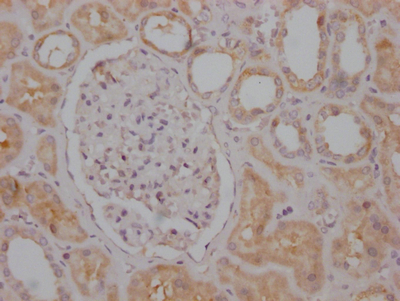
IHC image of CSB-RA581950A0HU diluted at 1:100 and staining in paraffin-embedded human small intestine tissue performed on a Leica BondTM system. After dewaxing and hydration, antigen retrieval was mediated by high pressure in a citrate buffer (pH 6.0). Section was blocked with 10% normal goat serum 30min at RT. Then primary antibody (1% BSA) was incubated at 4°C overnight. The primary is detected by a Goat anti-rabbit IgG polymer labeled by HRP and visualized using 0.05% DAB.
RPTOR Recombinant Monoclonal Antibody
CSB-RA581950A0HU
ApplicationsELISA, ImmunoHistoChemistry
Product group Antibodies
ReactivityHuman
TargetRPTOR
Overview
- SupplierCusabio
- Product NameRPTOR Recombinant Monoclonal Antibody
- Delivery Days Customer20
- ApplicationsELISA, ImmunoHistoChemistry
- CertificationResearch Use Only
- ClonalityMonoclonal
- Clone ID1B10
- ConjugateUnconjugated
- Gene ID57521
- Target nameRPTOR
- Target descriptionregulatory associated protein of MTOR complex 1
- Target synonymsKOG1; Mip1; p150 target of rapamycin (TOR)-scaffold protein containing WD-repeats; raptor; regulatory-associated protein of mTOR
- IsotypeIgG
- Protein IDQ8N122
- Protein NameRegulatory-associated protein of mTOR
- Scientific DescriptionInvolved in the control of the mammalian target of rapamycin complex 1 (mTORC1) activity which regulates cell growth and survival, and autophagy in response to nutrient and hormonal signals; functions as a scaffold for recruiting mTORC1 substrates. mTORC1 is activated in response to growth factors or amino acids. Growth factor-stimulated mTORC1 activation involves a AKT1-mediated phosphorylation of TSC1-TSC2, which leads to the activation of the RHEB GTPase that potently activates the protein kinase activity of mTORC1. Amino acid-signaling to mTORC1 requires its relocalization to the lysosomes mediated by the Ragulator complex and the Rag GTPases. Activated mTORC1 up-regulates protein synthesis by phosphorylating key regulators of mRNA translation and ribosome synthesis. mTORC1 phosphorylates EIF4EBP1 and releases it from inhibiting the elongation initiation factor 4E (eiF4E). mTORC1 phosphorylates and activates S6K1 at Thr-389, which then promotes protein synthesis by phosphorylating PDCD4 and targeting it for degradation. Involved in ciliogenesis.
- ReactivityHuman
- Storage Instruction-20°C or -80°C
- UNSPSC12352203

